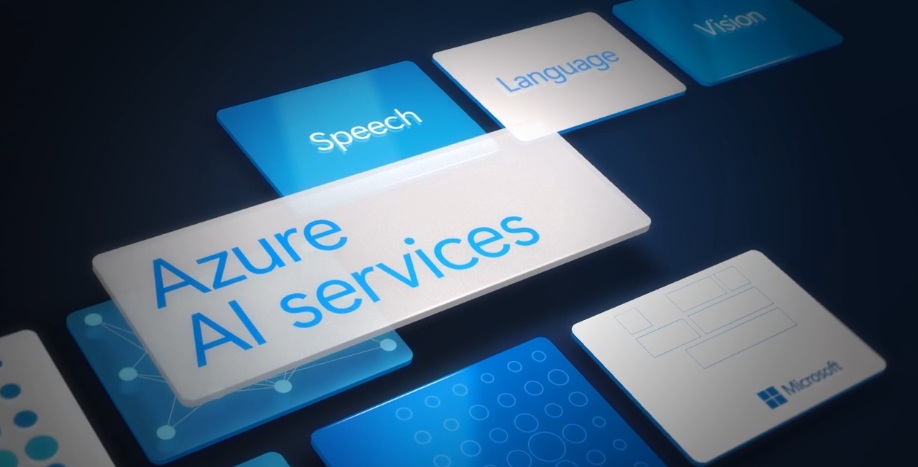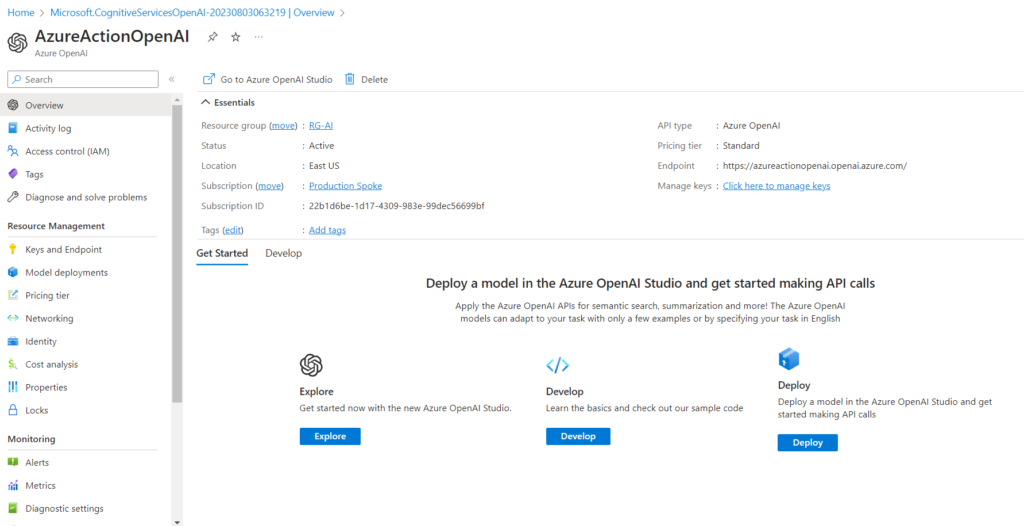
Azure OpenAI: Revolutionizing Business with Artificial Intelligence

Artificial Intelligence (AI) has become a game-changer for businesses, empowering them to automate tasks, predict outcomes, and drive innovation. Azure Open AI, a powerful platform offered by Microsoft, has emerged as a leading player in the AI landscape. In this article, we will explore the features, benefits, and use cases of Azure Open AI, as well as how businesses can leverage its functionalities to gain a competitive edge.
I. Introduction
A. Overview of Azure OpenAI
Azure Open AI is a cloud-based service that allows businesses to harness the power of AI to build intelligent applications and systems. It provides a wide range of tools, frameworks, and resources that facilitate the development and deployment of AI models. With Azure Open AI, businesses can access advanced AI capabilities without the need for extensive expertise in data science or machine learning.

B. Importance of Azure OpenAI for businesses
In today’s rapidly evolving digital landscape, businesses need to stay ahead of the curve to remain competitive. Azure Open AI offers a unique opportunity for organizations to unlock the potential of AI and transform their operations. By leveraging Azure OpenAI, businesses can streamline processes, deliver personalized experiences to customers, and gain valuable insights from data-driven decision making.
II. Understanding Azure OpenAI
A. Definition of Azure OpenAI
Azure Open AI is a comprehensive suite of AI tools and services offered by Microsoft Azure. It provides a flexible and scalable platform for developing, training, and deploying AI models. From natural language processing to computer vision and predictive analytics, Azure OpenAI supports a wide range of AI capabilities that can be customized to meet specific business needs.
B. Features and capabilities of Azure OpenAI
Azure Open AI offers a plethora of features and capabilities that empower businesses to leverage AI technology effectively. These include:
- Machine learning and deep learning frameworks: Azure OpenAI provides pre-built frameworks such as TensorFlow and PyTorch, enabling businesses to develop sophisticated machine learning models.
- Cognitive services: Businesses can utilize Azure OpenAI’s cognitive services, such as language understanding, sentiment analysis, and image recognition, to enhance their applications with AI capabilities.
- Bot services: With Azure OpenAI, businesses can build intelligent chatbots and virtual assistants that provide personalized and interactive customer experiences.
C. Integration of Azure OpenAI with existing systems
One of the key advantages of Azure Open AI is its seamless integration with existing systems and tools. Businesses can leverage Azure Open AI’s APIs and SDKs to integrate AI capabilities into their applications, databases, and workflows. This ensures a smooth transition to AI-powered solutions without the need for costly infrastructure upgrades or replacements.
III. Benefits of Azure OpenAI
A. Improved efficiency and productivity
By automating repetitive tasks and processes, Azure Open AI empowers businesses to optimize their operations and improve efficiency. This allows employees to focus on higher-value tasks, leading to increased productivity and reduced costs.
B. Enhanced customer experience
With Azure Open AI, businesses can deliver personalized experiences to their customers. Intelligent chatbots and virtual assistants can understand and respond to customer queries, providing real-time support and improving customer satisfaction.
C. Cost savings and scalability
Azure Open AI offers a pay-as-you-go pricing model, allowing businesses to scale their AI initiatives according to their needs. This eliminates the need for large upfront investments and provides cost savings through efficient resource allocation.
IV. Use cases of Azure OpenAI
A. Natural language processing and understanding
Azure Open AI’s natural language processing capabilities enable businesses to analyze and understand human language. This opens up opportunities for sentiment analysis, language translation, and intelligent text summarization, among other applications.
B. Machine learning and predictive analytics
With Azure Open AI, businesses can leverage machine learning algorithms to predict outcomes and make informed decisions. This can be particularly useful in areas such as fraud detection, demand forecasting, and personalized recommendations.
C. Chatbots and virtual assistants
Azure Open AI’s bot services empower businesses to build intelligent chatbots and virtual assistants that can interact with customers in a conversational manner. These AI-powered assistants can handle common queries, provide product recommendations, and offer personalized assistance, ultimately enhancing the overall customer experience.
V. How to get started with Azure OpenAI
A. Setting up an Azure account
To get started with Azure Open AI, businesses need to create an Azure account. This can be easily done by visiting the Azure website and following the registration process.


B. Accessing Azure OpenAI tools and resources
Once the Azure account is set up, businesses can access Azure Open AI’s tools and resources through the Azure portal. The portal provides a user-friendly interface for managing AI projects, deploying models, and monitoring their performance.

C. Tutorials and documentation for beginners
Azure Open AI offers a wealth of tutorials, documentation, and resources for beginners. These materials provide step-by-step guidance on various AI concepts, programming languages, and best practices for developing AI models with Azure.
VI. Challenges and considerations with Azure OpenAI
A. Data privacy and security
As AI relies heavily on data, businesses must ensure that data privacy and security measures are in place. Azure Open AI provides robust security features and complies with industry regulations, but businesses need to adhere to best practices for data management and protection.
B. Ethical implications of AI technology
As AI becomes more pervasive in businesses, ethical considerations must be taken into account. Azure Open AI encourages responsible AI practices and provides guidelines for ethical AI development and deployment.
C. Training and skill requirements
While Azure Open AI offers powerful tools and resources, businesses still require trained professionals with expertise in AI development. Training existing employees or hiring AI specialists may be necessary to fully leverage the potential of Azure Open AI.
VII. Future prospects of Azure OpenAI
A. Advancements in AI technology
Azure Open AI is continuously evolving to embrace the latest advancements in AI technology. With ongoing research and development, it is expected that Azure Open AI will offer even more powerful and innovative features in the future.
B. Industry trends and predictions
As the demand for AI continues to grow, Azure Open AI is well-positioned to capitalize on industry trends. The adoption of AI technology across sectors is expected to skyrocket, presenting numerous opportunities for businesses to leverage Azure Open AI in their digital transformation journey.
C. Potential applications in various sectors
Azure Open AI has vast potential for application in a wide range of sectors. From healthcare and finance to manufacturing and retail, businesses across industries can benefit from Azure Open AI’s capabilities, improving processes, and unlocking new possibilities.
VIII. Conclusion
In conclusion, Azure Open AI is a game-changing platform that allows businesses to harness the power of AI and transform their operations. With its diverse features, seamless integration, and benefits such as improved efficiency, enhanced customer experience, and cost savings, Azure Open AI empowers businesses to stay competitive in the digital age. By leveraging this robust AI platform, businesses can unlock new opportunities, gain valuable insights, and drive innovation like never before.
Frequently Asked Questions (FAQs)
1. Is Azure Open AI suitable for small businesses? Absolutely! Azure Open AI offers a flexible and scalable platform that can be tailored to the needs of small businesses. It provides an opportunity for small businesses to leverage AI technology without extensive resources or expertise.
2. Can Azure Open AI be integrated with existing software systems? Yes, Azure OpenAI can be seamlessly integrated with existing software systems. Its APIs and SDKs allow businesses to leverage AI capabilities within their applications, databases, and workflows, without the need for significant infrastructure changes.
3. What kind of support is available for beginners using Azure OpenAI? Azure OpenAI provides extensive tutorials, documentation, and resources for beginners. These materials cover various AI concepts, programming languages, and best practices, enabling beginners to get started with Azure Open AI easily.
4. Are there any ethical considerations when using Azure OpenAI? Yes, ethical considerations are important when using AI technology in general, including Azure Open AI. Microsoft promotes responsible AI practices and provides guidelines for ethical AI development and deployment.
5. What is the pricing model for Azure OpenAI? Azure OpenAI offers a pay-as-you-go pricing model, allowing businesses to scale their AI initiatives according to their needs. This model ensures cost savings by only paying for the resources utilized.